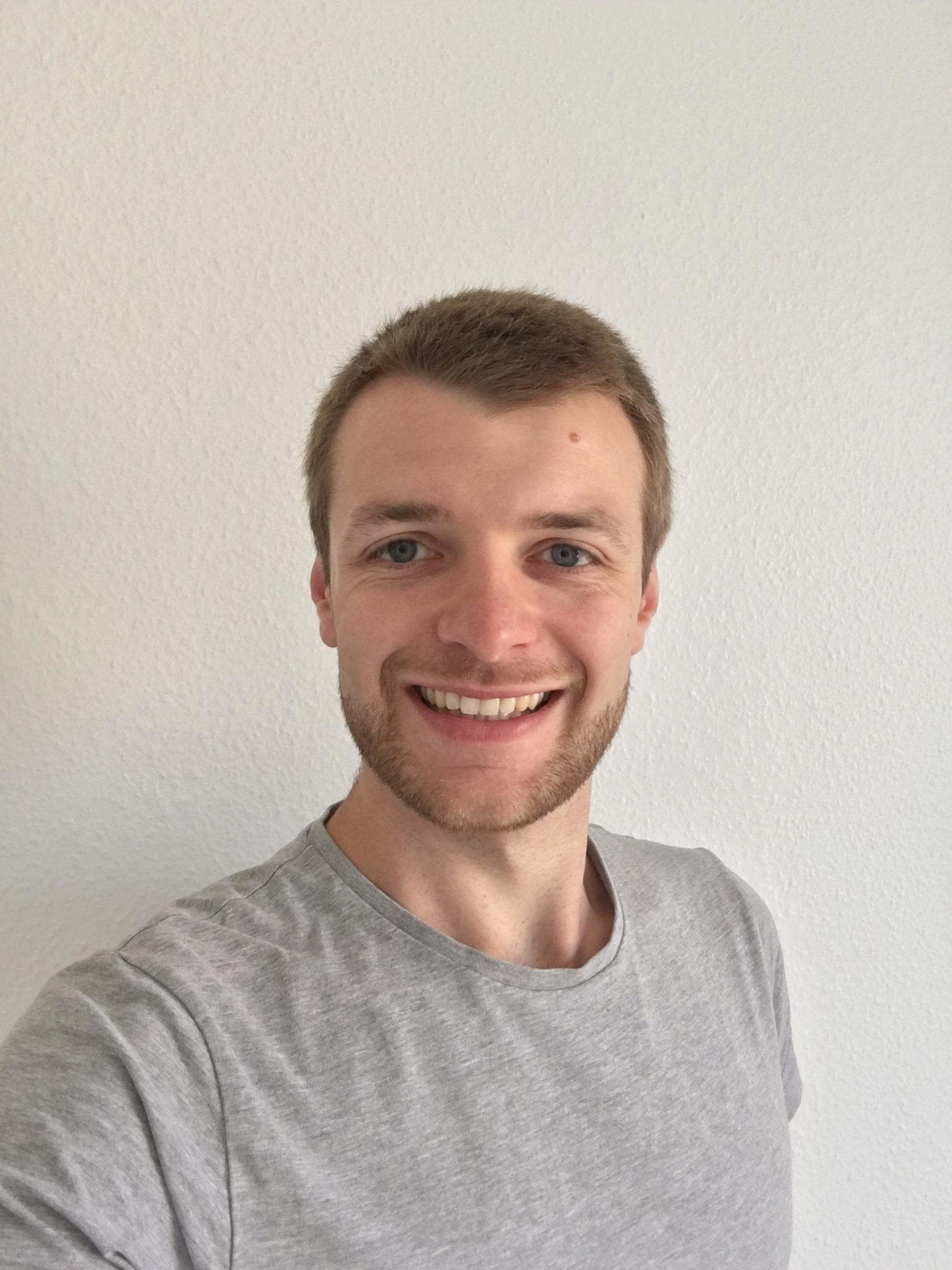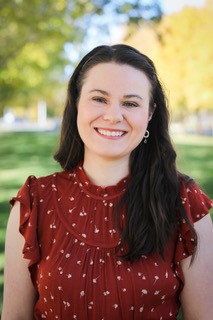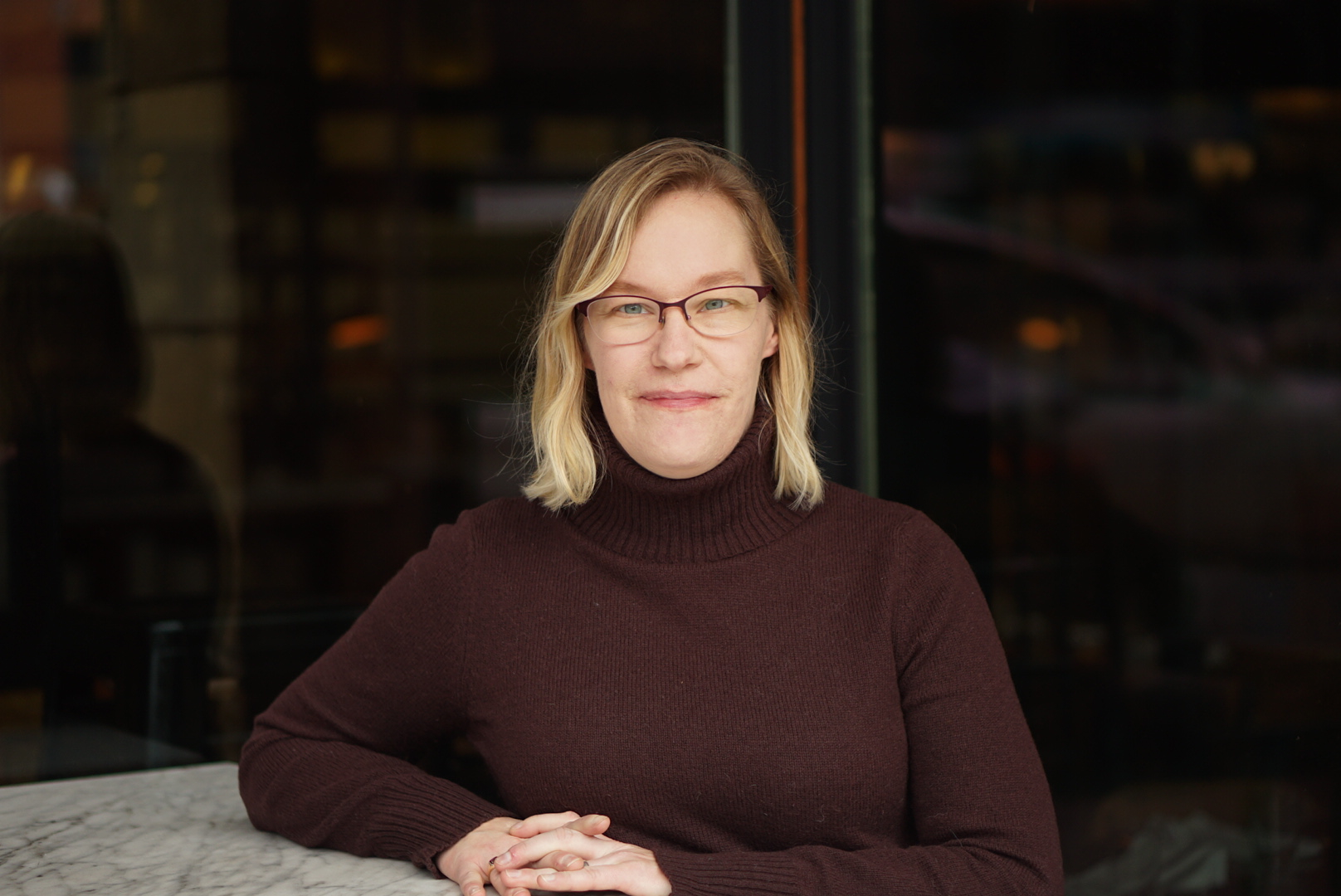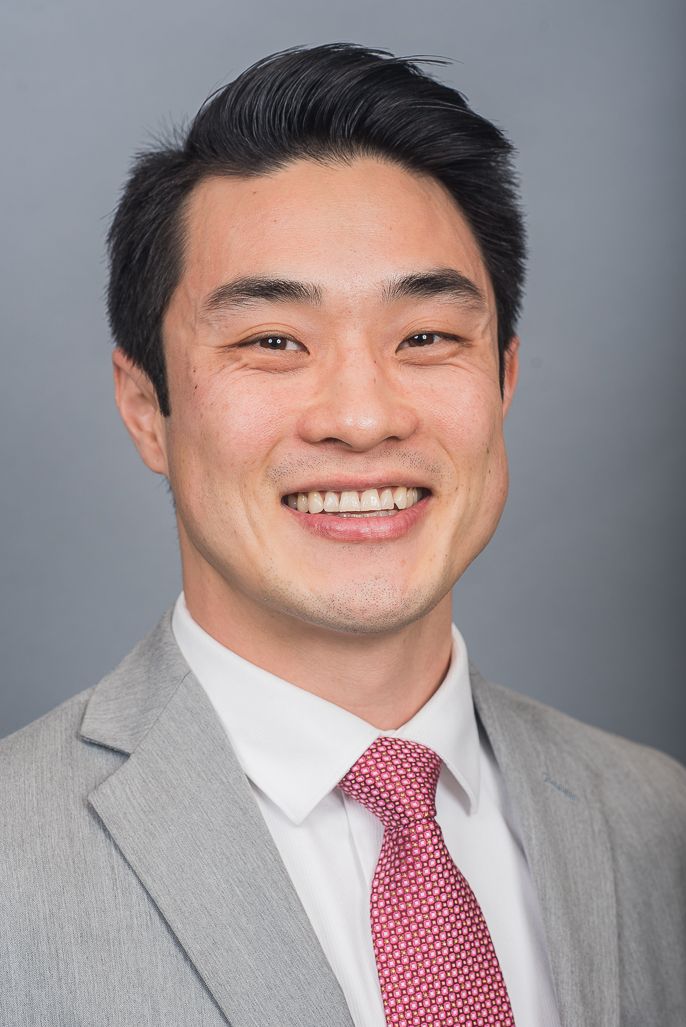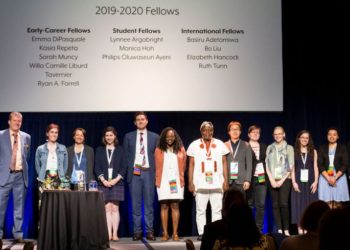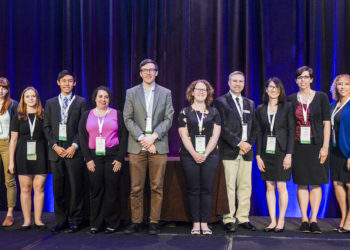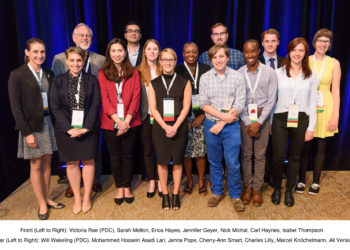In what has become an annual tradition, below we ask the 2020-2021 winners of the Society for Scholarly Publishing’s (SSP’s) Fellowships for their impressions of the 2021 SSP Annual Meeting. The SSP Fellowship program provides leadership opportunities and mentoring to Early Career and Student members of SSP.
Prior to 2021, the Annual Meeting was the start of the Fellowship year. With the cancellation of the 2020 meeting, the program was flipped making the Annual Meeting the capstone of the program year. There have been many benefits to making this change, not the least of which is that Fellows were invited to present a poster at this year’s Annual Meeting. The poster sessions were new this year and a very welcome addition. Fellows proposed topics of interest, developed their posters, created a video to post alongside the poster, and had live Q&A session with attendees.
Fellows also serve as C3 ambassadors, are assigned mentors, participated with Quick Connect micro-mentoring, and attended leadership development sessions with current and past SSP Presidents. This competitive program is funded through the SSP Generations Fund.
Now that you know about the Fellowship program, let’s hear how some of the 2020 Fellows answered the question: what did you learn at this year’s SSP Annual Meeting?

George Neame: Looking back at how the 2019 Fellows answered this question, they saw Plan S, sustainability and inclusivity as the big challenges facing publishing. Few could have anticipated that two years later we would continue to discuss these same challenges but against the backdrop of dramatic shifts in our lives and work cultures. But the theme of the 2021 meeting, “Charting a New Course from Chaos to Innovation,” perfectly summed up how the disruption of the COVID-19 pandemic has in turn led to unexpected opportunities for change in the publishing industry’s priorities, policies and practices, from flexible working to public health responsibilities and social justice. The next step is to seize those opportunities, and the meeting gave me confidence that the industry has recognized the possibility of lasting change.
The keynote speeches by Dr. Laura Helmuth and Dr. Joseph Williams succinctly captured two of the year’s most pressing issues. Dr. Helmuth shared key insights into how the publishing industry can challenge misinformation in the COVID era, while Dr. Williams demonstrated the importance of turning support into action in the fight against racial inequity. My interest in preprints and recent developments in “publish then review” peer-review models led me to the educational session “Preprints and the Editorial Work of Journals”. Jonathon Coates’ comment that we should not treat preprints more like publications but treat publications more like preprints and approach everything we read with caution has stuck with me since the meeting as a useful way of framing discourse around what is “trustworthy” or “reliable.” I was very grateful for the opportunity to present my own poster on the future of innovations in peer review, and found answering questions on this poster to be informative and thought-provoking. What I found most surprising and valuable from these conversations was the variety of attendees’ perspectives and the opportunity to discuss key topics with librarians, data analysts, society representatives, and publishers.
The next step is to seize those opportunities, and the meeting gave me confidence that the industry has recognized the possibility of lasting change.
I must say a huge thank you to the Fellows committee who put in a lot of hard work to overcome the year’s challenges and ensure the success of the program, to everyone who has supported the program, and to the SSP community who were so welcoming at the conference itself and always found time for a chat in the slightly surreal virtual conference lobby or bar.
Georgie Field: The huge variety of sessions at the Annual Meeting gave me plenty of food for thought, and many more ideas than could fit in a single blog post. The diversity of topics, and lively discussions that followed left me feeling engaged, enthused, and a bit exhausted(!)
As an Associate Publisher working for a not-for-profit on open access (OA) journals and business models, I think a lot about participation and what equity could look like in the OA space. Something Kamran Naim said in the “Open Access Without Authors Paying an APC?” session really resonated, and got me thinking more about the direction of travel of the publishing industry. He said, “we should be designing for dignity.” This was in reference to waiver programs and the requirement of authors to ask for charity, and it holds true in almost all elements of our work as publishers.
There are challenges ahead to put words into action, and to innovate in ways that put dignity and equity at the forefront.
The opening keynote by Dr. Laura Helmuth spoke about our collective responsibility to fight miscommunication as the gatekeepers of knowledge – who we open that gate to, and how we do it, is a conversation that has come up multiple times in recent years. Dr. Joseph M. Williams spoke on racial equity and inclusivity, and the glass ceiling panel spoke on barriers for those with disabilities. All of these sessions come back to the issue of dignity and building an industry where everyone thrives.
Reflecting on the meeting several weeks later, the theme of “Charting a New Course: From Chaos to Innovation” was a very timely one; there are challenges ahead to put words into action, and to innovate in ways that put dignity and equity at the forefront. I am excited to be part of that charge and to see the progress that we’ve made by the next meeting.
Hannah Vinchur: What an absolutely wonderful first SSP conference! I echo many previous fellows in saying that while I had full confidence the conference content would be outstanding, I was unprepared for the kind and welcoming community I found, particularly in an online platform that was new to everyone. I heard from many attendees this conference was one of the most successful online events they’d attended this year, and I congratulate the entire SSP staff and planning committee on such a successful event. What an achievement in an unexpected year.
I appreciate how the conference began with Dr. Laura Helmuth’s brilliant keynote discussing misinformation and where we place focus as an industry. Her questions of “Who are we amplifying; what ideas are we sharing; and how can we work to make things more inclusive and just?” spoke to the heart of the conference and was a good reminder of the scholarly publishing field’s ultimate impact. Her discussion of the relationship between scientists and the public was also fascinating and gave me new insight into how scholarly publishing fits into that relationship.
I was unprepared for the kind and welcoming community I found, particularly in an online platform that was new to everyone.
Another topic of discussion I found interesting was open access models. Working for an OA journal, I’m aware of our policies, but I was less familiar about other OA practices, including modifying existing models to move toward OA and the larger discussion concerning APCs. I was particularly excited to learn more about PLOS’s Community Action Publishing (CAP) model. I also appreciated the sentiment expressed by Dr. Kamran Naim that publishing waivers are not a “dignified solution” for authors. To me, this session encapsulated the SSP spirit: innovation and humanity. We want efficacy, but we also want to treat people well.
Thank you again for a truly wonderful first conference experience. What an honor to be a Fellow this year!
Michelle Urberg: SSPs Annual meeting was a nice conclusion to a year as an SSP Fellow. This fellowship year was a bit unusual given that we never met our cohort in person. That being said, I appreciated the dedication that Kelly Denzer and all of the other SSP members who spoke and otherwise contributed to the programming for the early career fellows.
The panel was well-received, but more importantly, it is a testament to SSPs desire to follow changing needs in the scholarly communication.
I have attended a number of virtual professional meetings, with SSP being the most recent. I appreciated being given the opportunity to present at the meeting. Katherine Burton (Taylor and Francis), with whom I had collaborated previously, reached out to see if I would speak to the needs of metadata for publicly engaged scholarship in the humanities. I and other experts working in and around humanities scholarship spoke about the challenges of creating, disseminating, and preserving publicly engaged content outputs (Publishing and Publicly Engaged Scholarship: Model Practices for Publication in the Humanities). The panel was well-received, but more importantly, it is a testament to SSPs desire to follow changing needs in the scholarly communication. I was glad to see this type of panel on the program alongside topics well-known in scholarly communications.
The vibe of the SSP annual meeting was, for me, similar to my experience with being a fellow: SSP has been open and welcoming. I feel like I can both participate in and benefit from SSP going forward. It has been a good professional experience for me and came at an ideal time in my career.
David Kim: When I virtually logged-on for this, my first ever, SSP Annual Meeting, I had high hopes to learn from industry colleagues sharing about all of the exciting innovation happening to deliver more value to our end-users while also diversifying programs in an evolving scholarly publishing landscape. SSP outdid itself and I certainly accomplished this goal and beyond from the plethora of incredibly interesting and novel sessions, networking opportunities, and discourse with brilliant industry minds. However, I feel the most meaningful, even behavior-changing, take away from my experience was something different.
I already knew from Wiley’s own annual global membership surveys that access to quality content, career development resources, and community are consistently the top three things that society members look for. Yet, while defining and satisfying content and career needs are relatively straightforward, defining community is amorphous and delivering on this elusively intangible society asset requires nothing less than administrative je ne sais quoi.
When members stay this committed it has a palpable network effect; those who tangibly benefit from the programs and feel they belong then meaningfully contribute, thus allowing others to benefit and to then contribute themselves, and so on.
If we had to whittle down the definition of a great society community, I would think it captured by a member’s strong sense of belonging. Well, here I’ll let the community speak for itself. Throughout Annual Meeting I heard countless times from attendees about how they save their entire annual professional development budget to attend SSP, or that the first thing they earmark in a fresh travel budget is to attend SSP, or simply and elegantly that this is their home society.
When members stay this committed it has a palpable network effect; those who tangibly benefit from the programs and feel they belong then meaningfully contribute, thus allowing others to benefit and to then contribute themselves, and so on. I’m deeply grateful for the incredible fellowship experience – the gift of time and sage advice from my mentor, Adrian Stanley, the tireless efforts from the army of dedicated volunteers, and the positive impact it’s already had on my own development. So, without hesitation, I can proudly say that I’m eager to give back to the SSP community – including volunteering in committees, sharing advice and perspectives in C3 and driving forward the Quick Connect initiative – and contributing to this wonderful community of friends and colleagues. Thank you, SSP, for the great sense of belonging. I’ve found my new home, too!
